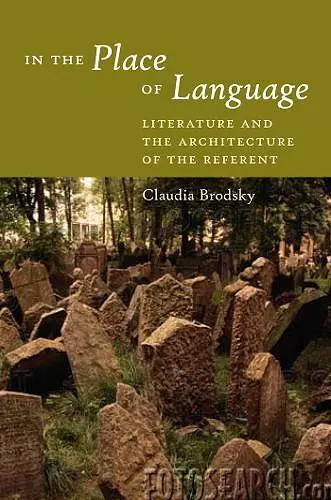In the Place of Language
Literature and the Architecture of the Referent
Format:Hardback
Publisher:Fordham University Press
Published:1st Sep '09
Currently unavailable, and unfortunately no date known when it will be back

The "place" in the title of Claudia Brodsky's remarkable new book is the intersection of language with building, the marking, for future reference, of material constructions in the world. The "referent" Brodsky describes is not something first found in nature and then named but a thing whose own origin joins language with materiality, a thing marked as it is made to begin with. In the Place of Language: Literature and the Architecture of the Referent develops a theory of the "referent" that is thus also a theory of the possibility of historical knowledge, one that undermines the conventional opposition of language to the real by theories of nominalism and materialism alike, no less than it confronts the mystical conflation of language with matter, whether under the aegis of the infinite reproducibility of the image or the identification of language with "Being."
Challenging these equally naive views of language - as essentially immaterial or the only essential matter - Brodsky investigates the interaction of language with the material that literature represents. For literature, Brodsky argues, seeks no refuge from its own inherently iterable, discursive medium in dreams of a technologically-induced freedom from history or an ontological history of language-being. Instead it tells the complex story of historical referents constructed and forgotten, things built into the earth upon which history "takes place" and of which, in the course of history, all visible trace is temporarily effaced. Literature represents the making of history, the building and burial of the referent, the present world of its oblivion and the future of its unearthing, and it can do this because, unlike the historical referent, it literally takes no place, is not tied to any building or performance in space.
For the same reason literature can reveal the historical nature of the making of meaning, demonstrating that the shaping and experience of the real, the marking of matter that constitutes historical referents, also defers knowledge of the real to a later date. Through close readings of central texts by Goethe, Plato, Kant, Heidegger, and Benjamin, redefined by the interrelationship of building and language they represent, In the Place of Language analyzes what remains of actions that attempt to take the place of language: the enduring, if intermittently obscured bases, of theoretical reflection itself.
"Beyond its stunning synthesis of philosophy and literature this book offers fresh readings of Goethe's two currently most discussed works." -Modern Language Quarterly "Building on Brodsky's earlier explorations of the interconnection between the discursive arts and the art of building, In the Place of Language situates the act of linguistic reference at the intersection of earth and edifice, indication and signification, convention and invention. Through nuanced readings of an impressive array of modern and contemporary artists and thinkers-Rousseau, Kant, Goethe, Proust, Schmitt, Benjamin, Heidegger, Lanzmann, Agamben-this book offers original insights into the relationship between the artistic, technological, and political modalities of the modernist project and in so doing suggests novel understandings of our contemporary situation. In the Place of Language will be of interest not only to those concerned with recent discussions in philosophy and literary studies, but also to those interested in understanding the place of architecture, as both empirical practice and as conceptual model, in the contemporary disposition of the cultural disciplines." -- -Andrew Payne University of Toronto "Refreshingly bold and brilliantly exacting, In the Place of Language gives us an entirely new language for understanding forms of historicity in the built structures of literature and theory. In Brodsky's capable hands the relationship between text and non-text does not devolve into mere context, but comes into view instead through the marked demarcation of experience in writing about the changes and challenges that history entails. Grounding her account of how space, time, and matter itself come to matter in the architecture and architectonics of referential form, the author delivers breathtaking new readings of Goethe's Faust and Elective Affinities in vibrant and critical dialogue with Kant, Rousseau, Heidegger, Benjamin, Schmitt, Lanzmann, Agamben, and others. In the Place of Language is a crystalline and indispensable book for thinking about the properties and stakes of loss and presence, life and death, building and language in major literary works and critical theories of modern history into the 21st century." -- -Leslie A. Adelson Cornell University "Passionately and with abundant erudition Claudia Brodsky turns against traditional ideas of language and prefers to investigate the question of why so many fundamental works of literature and philosophy depend on architecture to demarcate a space in which imagination lingers to discover past and future. Claudia Brodsky intensely involves us in her argumentation, whether she concentrates on an incisive moment in Claude Lanzmann's movie 'Shoah', effectively employs Kant to deflate Agamben or interprets Plato, Rousseau, Heidegger, Benjamin, Proust or Goethe's most important novel and dramas. I know few recent books of such force and rare originality." -- -Peter Demetz Yale University "A truly engaging, profoundly challenging and superb piece of critical scholarship and theory, of great importance for current debates on language, architecture, and aesthetics and the functions of space and time." -- -Willi Goetschel University of Toronto "An outstanding work of scholarly erudition, penetrating analyses, and original insights, Brodsky's book makes a remarkable contribution to the study of Goethe and general literary theory, offering penetrating new readings of two of Goethe's most demanding and philosophically invested works." -- -Clark Muenzer University of Pittsburgh
ISBN: 9780823230006
Dimensions: unknown
Weight: unknown
192 pages